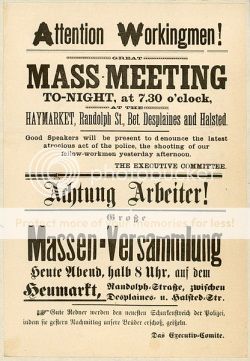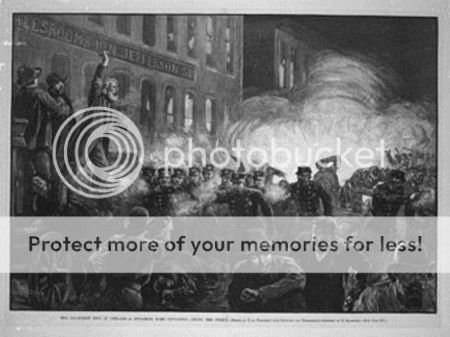
In many locations, around the world, May 1st (May Day) is also International Worker’s Day – which commemorates the Haymarket riot in Chicago in May of 1886. Although labor activists and police were killed in the violence, the riot helped lead to the 8 hour work day even non-union workers enjoy today. So today, find and thank a Union member…
The Haymarket meeting and bombing, the subsequent riot, arrests, trial, and executions, and related events of the period form one of the most remarkable episodes in the history of Chicago, the United States, and of working people everywhere. On the evening of May 4, 1886, a few thousand people assembled in the Haymarket area at the intersection of Randolph and Desplaines Streets, across the South Branch of the Chicago River about eight blocks west of City Hall. The purpose of the rally was to protest the killing of two workers the previous day by the police when they broke up an angry confrontation between locked-out union members and their replacements at the McCormick reaper factory on the city’s Southwest Side. This confrontation was one of many outbreaks of violence at the time due to labor and class tensions. Central among labor’s demands was the eight-hour workday.
As the protest meeting in the Haymarket was nearing a close, about 180 police marched from the nearby Desplaines Street station to the makeshift speakers’ stand. Immediately after a police commander ordered the rally to disperse, someone threw a dynamite bomb into the ranks of the officers. One officer was killed almost instantly, and six more would die in the next few days and weeks of wounds either caused by the bomb or sustained in the riot that followed. Acting with overwhelming public support, the police arrested dozens of political radicals. In the trial that followed, eight anarchists were found guilty of murder. After appeals to the Illinois and United States Supreme Courts failed, four of the defendants were executed on November 11, 1887. One day before the hangings, another defendant committed suicide. Illinois Governor Richard Oglesby commuted the capital sentence of two other defendants to life in prison. The jury had sentenced the eighth defendant to fifteen years at hard labor.
Scholars have long considered the Haymarket trial one of the most notorious miscarriages of law in American history. At this time of cultural crisis, the defendants were convicted by a prejudiced judge and jury because of their political views, rather than on the basis of solid evidence that linked them to the bombing. Although most middle-class Americans and even many working people at the time cheered this action and praised the police as defenders of public order, the executions transformed the anarchists into martyrs of labor in this country and throughout the world. The cultural memory of Haymarket has echoed ever since through many other events.
Starting with the United Mine Workers in 1898 there was a steady move to an 8 hour work day that was finally given to all workers by federal law in 1937 as part of the Fair Labor Standards Act.
So if you think about complaining the weekend is too short or you’re watching the clock so you can leave after your 8 hour shift, find a Union member and thank them for their historic support of the worker.


